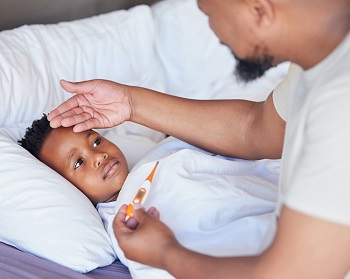Tips for African Parents on Caring for a Child with Fever at Home Safely
By Promise Oladejo, Freelance Health Writer and DLHA Volunteer. Medically reviewed by: T. Oyetunji, MBBS, FWACP (Family Medicine).

A father with thermometer on hand checking for fever in a sick child lying on a bed. Image credit: Freepik.
Fever is a common symptom in children and is usually the body's way of fighting infections. While it can be alarming for parents, most fevers are not dangerous and can be managed at home. However, knowing how to care for a child with fever at home and when to seek medical help is essential. This guide provides African parents with practical, medically accurate tips to help their children recover from fever safely at home.
.jpg)
A digital thermometer showing fever in the high range.
Before you think of treating a fever, it is important to confirm that your child actually has one.
A fever is defined as a body temperature of 37.5°C (99.5°F) or higher (1). Here’s how to measure it correctly:
If your child has a mild fever but is eating and playing normally, home care may be enough. Here are safe ways to bring down a fever naturally (6):
While most fevers do not require medication, fever-reducing medicines can be used if your child is uncomfortable: (7)
Fever causes the body to lose fluids faster. To prevent dehydration:
Adequate rest helps a child recover faster.
Parents and caregivers should seek immediate medical attention if a child with fever exhibits any of the following warning signs: (9)
Common Mistakes African Parents Make When Caring for a Child with Fever at Home
Avoid these common errors when managing your child’s fever at home:
Fever is a natural defense mechanism, and most cases can be managed at home with proper care. By following these tips, parents can ensure their child remains comfortable and safe. However, it is crucial to recognize warning signs and seek professional help when needed. With the right knowledge, African parents can confidently handle fever episodes and support their child's recovery.
1. Kiemde F, Tahita MC, Lompo P, Rouamba T, Some AM, Tinto H, Mens PF, Schallig HD, van Hensbroek MB. Treatable causes of fever among children under five years in a seasonal malaria transmission area in Burkina Faso. Infectious diseases of poverty. 2018 Jun 1;7(03):35-44. Accessed from here.
2. Adesegun OA, Adeyemi OO, Ehioghae O, Rabor DF, Binuyo TO, Alafin BA, Nnagha OB, Idowu AO, Osonuga A. Current trends in the epidemiology and management of enteric fever in Africa: a literature review. Asian Pacific Journal of Tropical Medicine. 2020 May 1;13(5):204-13. Accessed from here.
3. Oshikoya KA, Senbanjo IO. Fever in children: Mothers' perceptions and their home management. [Internet]. Tehran University of Medical Sciences Press. 2009 January 21. [Cited March 26, 2025. Available from here.
4. Nooh F, Chernet A, Reither K, Okuma J, Brattig NW, Utzinger J, Probst-Hensch N, Paris DH, Dreyfus A. Prevalence of fever of unidentified aetiology in East African adolescents and adults: a systematic review and meta-analysis. Infectious Diseases of Poverty. 2023 May 25;12(1):55. Accessed from here.
5. Adeboye A, Yusuf RA, Ige OK. Fever: a literature review of perceptions, perspectives and practices. J Tradit Med Clin Naturop. 2017;6:249. Accessed from here.
6. D'acremont V, Kilowoko M, Kyungu E, Philipina S, Sangu W, Kahama-Maro J, Lengeler C, Cherpillod P, Kaiser L, Genton B. Beyond malaria—causes of fever in outpatient Tanzanian children. New England Journal of Medicine. 2014 Feb 27;370(9):809-17. Accessed from here.
7. Green R, Webb D, Jeena PM, Wells M, Butt N, Hangoma JM, Moodley RS, Maimin J, Wibbelink M, Mustafa F. Management of acute fever in children: Consensus recommendations for community and primary healthcare providers in sub-Saharan Africa. African Journal of Emergency Medicine. 2021 Jun 1;11(2):283-96. Accessed from here.
8. Fernandes JF, Held J, Dorn M, Lalremruata A, Schaumburg F, Alabi A, Agbanrin MD, Kokou C, Ben Adande A, Esen M, Eibach D. Causes of fever in Gabonese children: a cross-sectional hospital-based study. Scientific reports. 2020 Feb 7;10(1):2080. Accessed from here.
9. Laupland KB. Fever in the critically ill medical patient. Critical care medicine. 2009 Jul 1;37(7):S273-8. Accessed from here.
Related:
Published: May 29, 2025
© 2025. Datelinehealth Africa Inc. All rights reserved.
Permission is given to copy, use and share content freely for non-commercial purposes without alteration or modification and subject to source attribution.
DATELINEHEALTH AFRICA INC., is a digital publisher for informational and educational purposes and does not offer personal medical care and advice. If you have a medical problem needing routine or emergency attention, call your doctor or local emergency services immediately, or visit the nearest emergency room or the nearest hospital. You should consult your professional healthcare provider before starting any nutrition, diet, exercise, fitness, medical or wellness program mentioned or referenced in the DatelinehealthAfrica website. Click here for more disclaimer notice.